Guitar strings play a pivotal role in shaping the sound & playability of the instrument, especially in genres with distinct tonal & performance demands like metal. Metal guitarists often require strings that can withstand aggressive playing techniques and deliver a tone that’s both heavy & articulate. The choice of guitar strings for metal can dramatically affect the expressiveness and durability of the performance. Here’s our top choices for the best guitar strings for metal that will deliver those crushing riffs with clarity & precision.
In the realm of metal, specific types of strings are better suited to handle the drop tunings and fast riffing commonplace in the genre. Heavier gauge strings, for example, provide the necessary tension and resilience needed for lower tunings without sacrificing tone or sustain. The material of the strings is also crucial, as certain metals can enhance the brightness, sustain, and string life. Stainless steel and nickel-plated steel are popular choices that offer a balance of durability and a sharp, cutting tone that complements the high gain amplification typically used in metal music.
When choosing guitar strings for metal, it’s important to consider factors such as string gauge, material, and core type. Heavier gauges provide the necessary tension for lower tunings, while materials like nickel and stainless steel deliver a crisp tone that cuts through dense distortion. The core design — round versus hex — also impacts flexibility and tone, with hex cores generally providing a tighter, more focused sound.
Combining our expertise in music gear with extensive research and testing, we have identified a range of guitar strings that cater specifically to the needs of metal guitarists, balancing durability, tonal clarity, and response. Our findings aim to simplify the selection process, helping players unlock their full potential and achieve that signature metal sound.
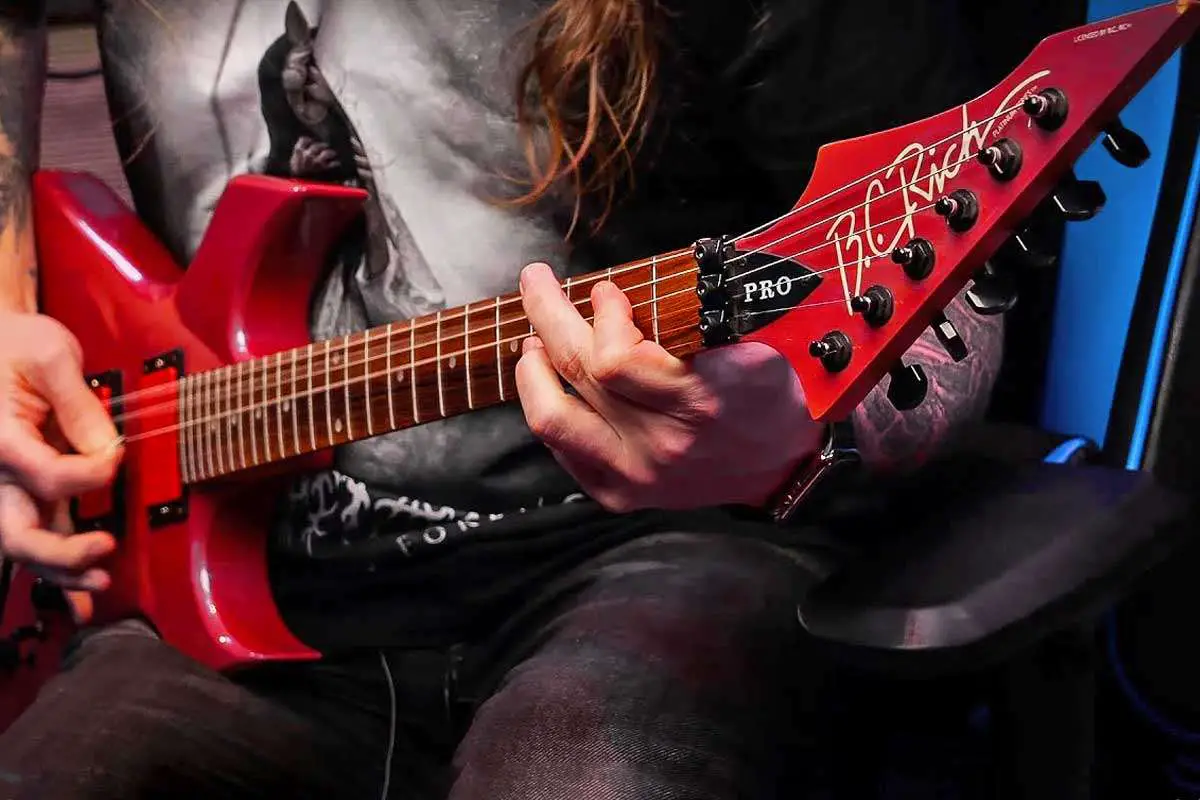
Top Guitar Strings for Metal Enthusiasts
As metal guitarists, we understand the importance of using the right strings to achieve that heavy, aggressive tone inherent to our genre. After conducting thorough research and real-world testing, we’ve compiled a list of the best guitar strings that can withstand the rigorous demands of metal playing. These strings promise durability, optimal tension, and the tonal clarity needed to articulate even the most complex riffs and solos. Whether you’re playing on stage or practicing at home, our selection will help you find the perfect set to complement your playing style and guitar.
Ernie Ball “Skinny Top Heavy Bottom” Cobalt Slinky
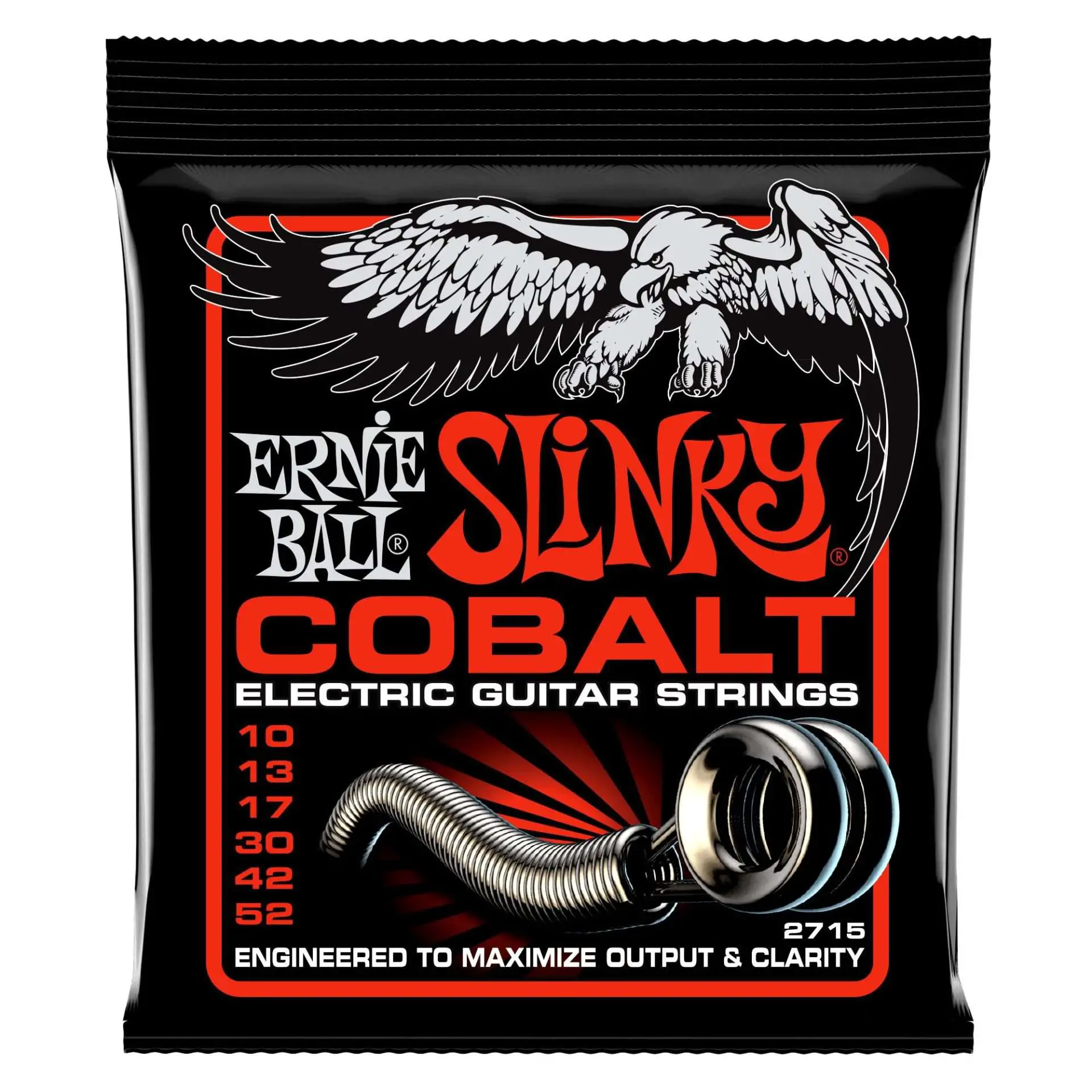
We believe these strings are a solid choice for metal players looking for an aggressive sound with a comfortable feel.
Pros
- Enhances pickup responsiveness for dynamic playing
- Balanced tension across strings aids in playing complex riffs
- Reliable tuning stability even in lower tunings
Cons
- Might be pricier than standard nickel strings
- Cobalt may feel different to players used to nickel
- Limited lifespan compared to coated strings
Cobalt Slinky strings have become a mainstay in our metal setups. Their unique magnetic alloy injects life into every note, delivering a harmonic richness that cuts through thick distortion. Riffs come alive with a crisp articulation on the high strings, while power chords land with a satisfying punchy heft.
Our playing sessions have shown these strings hold tune admirably – a crucial factor when detuning for those heavy breakdowns. They seem to lock into the right pitch and stay there, reducing the number of mid-jam tunings.
Durability, however, is where these strings sit on the edge of a double-edged sword. While they deliver on sound brilliantly, their longevity can’t quite match that of coated options although still excellent. For those of us who play aggressively, regular changes are a must to maintain that fresh sonic bite.
D’Addario “Light Top/Heavy Bottom” NYXL Strings
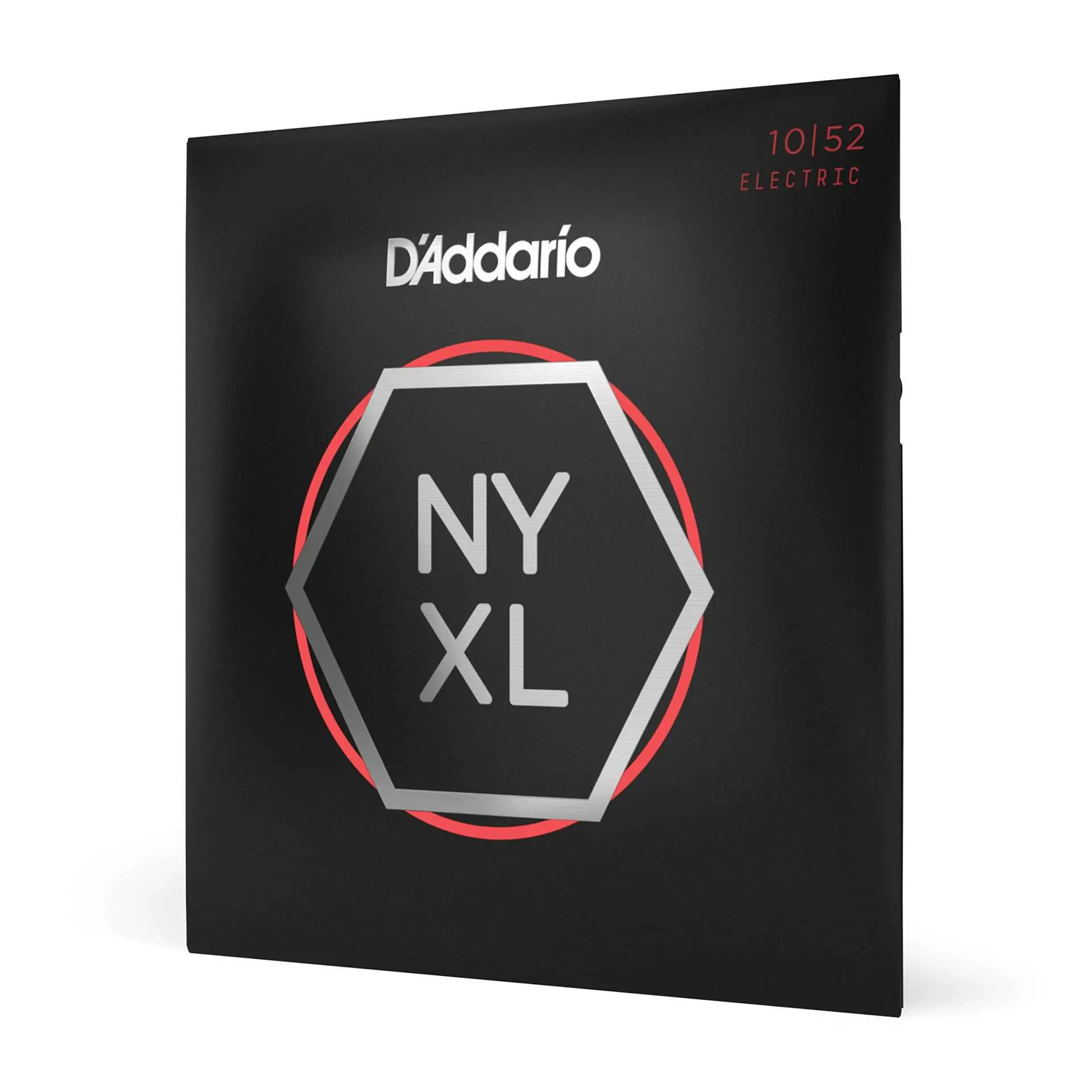
We think these strings are a solid buy for any metal guitarist looking to enhance their sound and play without the worry of frequent detuning.
Pros
- Unmatched durability that withstands aggressive playing
- Retains tuning exceptionally well, even with heavy bending
- Brightens tone with an enhanced mid-range for a distinct metal sound
Cons
- Pricier than some other strings on the market
- Might feel stiffer to some players, particularly with bending
- Enhanced mid-range may not suit players seeking a warmer tone
We’ve given these strings a thorough workout, and they’ve consistently impressed with their resilience. Hitting hard riffs and diving into deep bends, the NYXL strings hold up spectacularly, supporting the kind of intense playing that metal demands. There’s no fear of snapping a string in the middle of a gig with these; they’re engineered to to withstand a good thrashing.
The tuning stability of these strings is outstanding. We’ve found they stay in tune far better than standard strings, even after hours of practice. For metal players who employ aggressive techniques, this means more playing and less time fiddling with tuning pegs.
When it comes to tone, these strings carry the mid-range punch that can really help solos cut through the mix. Whether you’re laying down rhythm tracks or shredding a solo, the NYXL strings deliver a clear sound that stands out confidently amidst the distortions typical in metal music. The heavy bottom/skinny top options really give you the best of both worlds in any case, we highly recommend checking these out for those crushing lows & searing highs all in one package.
On the flip side, some might find the price a bit high, but considering their strength and fidelity, they’re an investment worth making. The initial stiffness might not cater to everyone’s liking, especially those used to lighter strings; however, they do tend to break in with time. Moreover, not every metal guitarist looks for an enhanced mid-range, and those who prefer a warmer, bass-heavy tone might need to look elsewhere.
Dunlop Heavy Core Strings
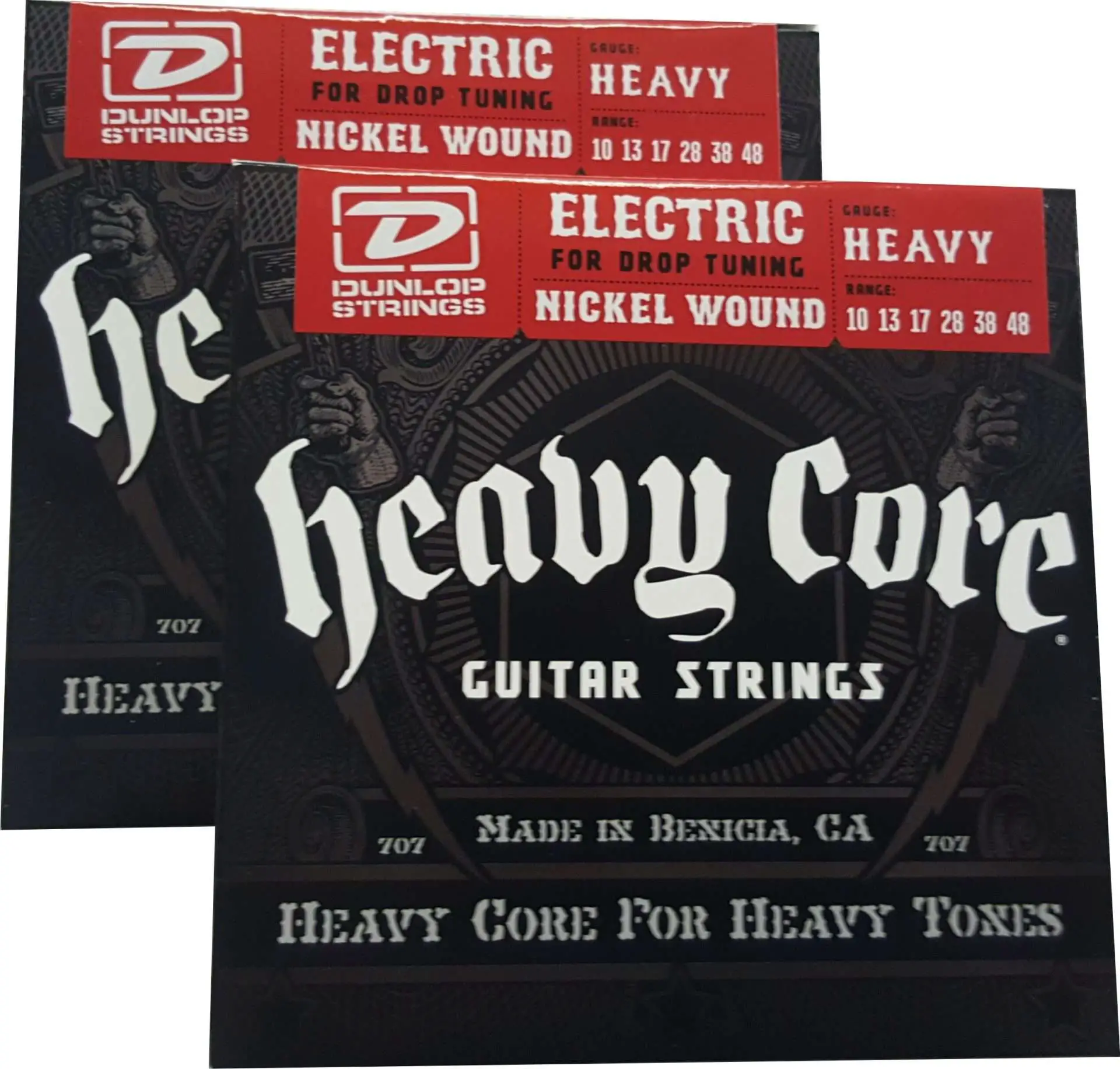
We recommend these strings for metal guitarists who crave stability and a low-end punch when down-tuning.
Pros
- Maintains tension and tone in lower tunings
- Durable construction
- Bright, clear sound with a tight low end
Cons
- Limited flexibility for players used to lighter gauges
- May require setup adjustments for optimal performance
- Not ideal for genres requiring a lot of bending
The Dunlop Heavy Core Heavy strings feel robust, perfect for the drop tunings that metal often demands. The nickel-plated steel delivers a crisp, clear tone that shines in riff-heavy sections and solos alike. We noticed the strings sustain well, providing the power and presence needed in high-gain scenarios.
Switching to these strings provided our guitar with a more pronounced low-end punch. They’re not just about power; the articulation on faster picking passages was commendable. Their durability is another plus; after weeks of heavy playing, they’re still free of corrosion and fatigue.
However, players who employ a fleet-fingered lead style might find the heavier gauge a bit restrictive. We needed to exert more force for bends, which could be a drawback for some. Those transitioning from lighter strings should also anticipate an adjustment period and, depending on the guitar, possibly a setup change.
Overall, Dunlop Heavy Core Heavy strings have impressed us with their performance for metal music—an excellent choice for guitarists seeking that solid, heavy-duty feel and sound.
DR Drop-Down Tuning Strings (DDT)

We believe that if you’re seeking strings that can handle aggressive playing and maintain stability in lower tunings, the DR Strings DDT set is an excellent choice.
Pros
- Achieve stable tuning quickly, ideal for metal players who frequently switch tunings.
- Maintain clear and crisp sound quality, even at lower pitches.
- Exceptional durability to withstand heavy playing without frequent breakages.
Cons
- Heavier gauge may not be suitable for those unaccustomed to the increased tension.
- Not as versatile for players seeking a softer tone or those who play a wide range of music styles.
- Potentially too niche for casual players who do not require specialized drop tuning strings.
Once I put these strings on my guitar, the difference was palpable. The claim that these strings lock into tune and remain stable held true, even when down-tuning to levels where other strings would get flubby. This stability is particularly important during gigs where you can’t afford to be constantly re-tuning between songs.
While playing through a chunky, palm-muted riff, I noticed the DR Strings DDT projected each note with pristine clarity. There was no muddiness that sometimes plagues other strings when tuned low, which is crucial when playing complex metal passages where note definition can make or break your sound.
The sturdiness of the strings stood out. After weeks of aggressive bends and dive bombs, they showed no signs of wear. Typically, I’m wary of strings that emphasize durability, as they often sacrifice tone, but this wasn’t the case here.
The DR Strings DDT offer a solution for metal guitarists seeking reliability and quality of sound in their drop tunings. After some heavy sessions, it was clear these strings were built to last and perform.
D’Addario XT Nickel Coated Strings
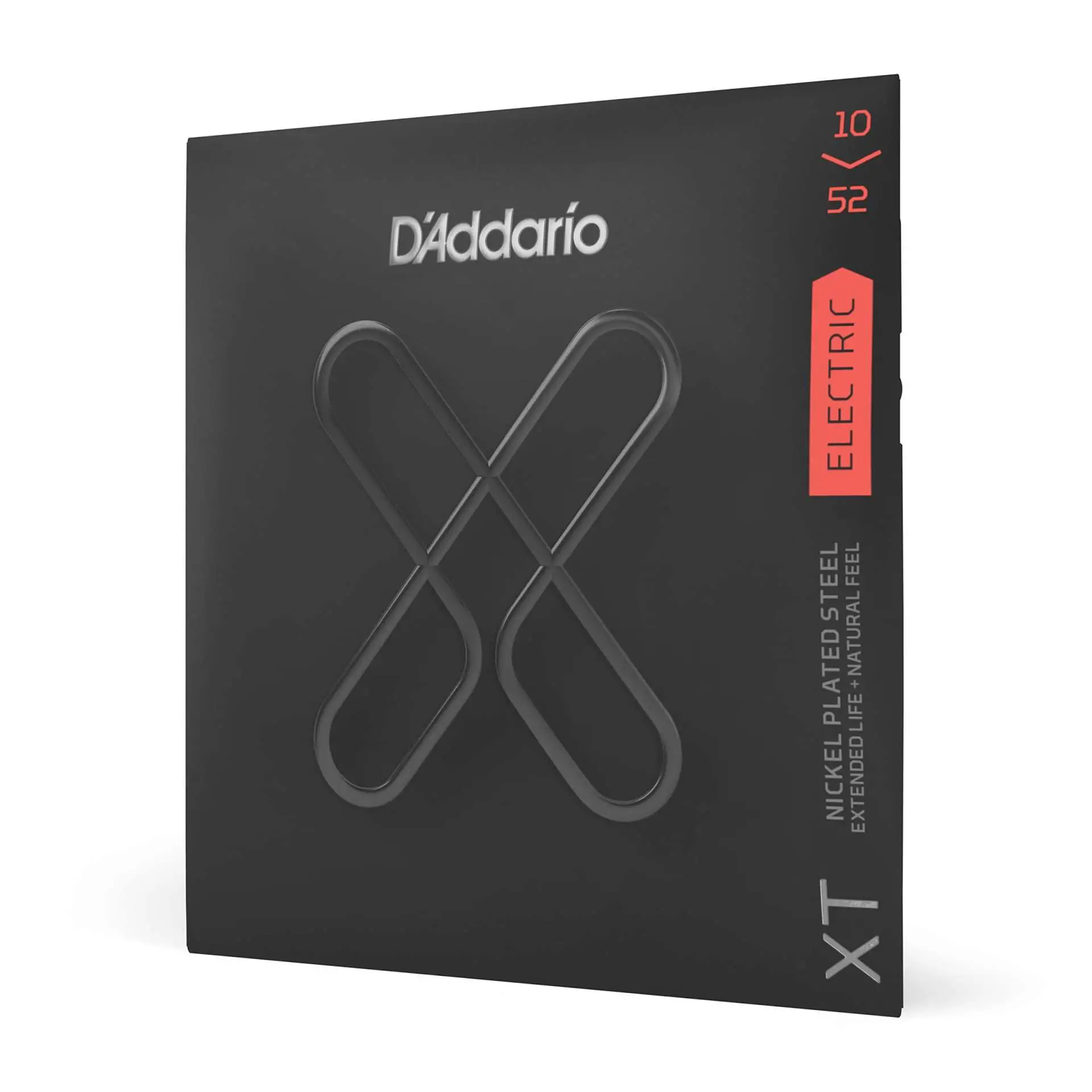
After stringing up our guitars with the D’Addario XT Nickel Coated Electric Strings, we highly recommend them for metal enthusiasts looking for durability combined with a natural feel.
Pros
- Superior corrosion resistance ensures longer string life
- Bright and versatile sound suits various metal genres
- Enhanced tuning stability and break strength add to reliability
Cons
- Higher price point than some uncoated strings
- Some may prefer the feel of traditional uncoated strings
- Coated strings might alter the tone slightly, which may not be to everyone’s taste
Our latest session was a blast after restringing our axes with the D’Addario XT strings. Their advanced corrosion resistance coating is no gimmick; these strings really do last, saving us both time and money in the long run. The tone is crisp, defined, and full of the energy needed for metal riffs and solos, without any compromise on that raw edge we all love.
We’ve found them to retain their tuning exceptionally well, which is crucial during gigs or intense practice sessions. The Fusion Twist technology used in these strings ensures we spend less time tuning and more time playing. With a break strength that can handle aggressive bending, we push our playing to the limits without fear.
These strings feel comfortable under our fingers, similar to uncoated strings, defying the stereotype that coated strings can be too slick or lack tactile feedback. Our playing expresses the subtleties in dynamics and articulation, making these strings a solid choice for both recording and live performances.
To sum it up, the D’Addario XT Nickel Coated Electric Strings strike the right balance between performance and longevity. They’ve upheld their tune through marathon jam sessions and struck a chord with their bright, punchy sound. Despite the few drawbacks, particularly for players on a budget or those who are uncoated string purists, we found their reliability and sound quality make them worth the investment for serious metal guitarists.
Buying Guide
When looking for the best guitar strings for metal, we must consider several key factors. Gauge, materials, and string core types play pivotal roles in the performance and sound quality of the strings.
Gauge
Gauge refers to the thickness of the strings. We generally categorize them into light, medium, and heavy gauges.
- Light: Offer ease of playability; ideal for fast solos.
- Medium: Balanced tone and durability.
- Heavy: Thicker strings produce a fuller, louder sound, suitable for heavy riffing.
Materials
The materials that strings are made from affect guitar tone and longevity.
- Nickel-Plated Steel: Balanced warmth and brightness, popular choice.
- Stainless Steel: Bright, crisp sound; resistant to corrosion.
- Cobalt: Enhanced output with a clear, cutting tone.
Core Types
- Hex Cores: More tension, brighter tone, good for heavy playing styles.
- Round Cores: Less tension, warmer tone, can facilitate bending.
String Coatings
Coated strings are treated with a protective layer that shields them from dirt, grime, and corrosion, which can be particularly beneficial for the aggressive playing styles often found in metal. This coating helps to extend the life of the strings and maintain their tone over time. However, coated strings are generally more expensive than uncoated strings, and some players feel the coating can slightly dampen the string’s brightness and alter the feel.
Here’s a brief table outlining the different types of string coatings and their respective benefits or drawbacks:
| String Type | Benefits | Drawbacks |
|---|---|---|
| Uncoated | – Brighter sound – More traditional feel | – Shorter lifespan – More prone to dirt and corrosion |
| Coated | – Longer lifespan – Resistant to dirt and corrosion | – More expensive – Some perceive a change in tone and feel |
For metal music, players typically seek strings that can withstand heavy playing and deliver a bright, aggressive tone. While uncoated strings offer the brightest sound, which might be desirable for cutting through high-gain settings, coated strings can be a wise investment for their durability and resistance to the elements, especially if you play frequently or have acidic sweat that can cause quicker deterioration of uncoated strings.
String Construction
Roundwound strings are common and known for their brightness and bite, which is favored in metal genres.
By understanding these elements, we can make informed decisions catered to our specific sound and playstyle preferences without having to rely on brand endorsements or disputable claims. Our focus should remain on the interaction between the strings and our personal technique to choose what enhances our metal sound most effectively.
